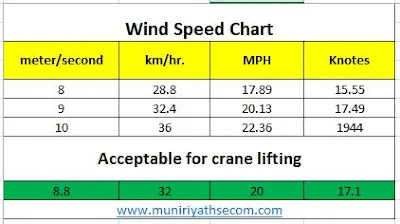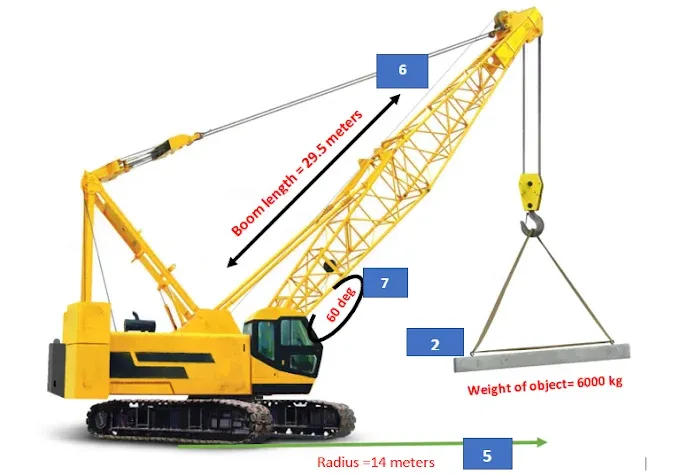Crane Lifting Plan
Disclaimer: "Lifting Plan" has been prepared to help the students who want to make their carrier in the occupational health and safety field (SABIC). It is not legal advice. It is not intended to replace the OSHA regulation or OSH regulation.
Critical Lifting, - 1
Weight of object,- 2
Rigging Weight, - 3
Total load weight - 4
Crane radius, - 5
Boom length to be used, - 6
Boom angle, - 7
Lift height, - 8
Crane capacity at work radius, - 9
load chart - 10
Safety factor, - 11
Wind speed - 12
Project:
Make a Lifting Plan with Safety Factor -
Crane capacity - 70 Ton, Total load- 7700 kg (object + contingency + rigging), Boom length- 29.5 meter, Load height- 4 meters, Radius- 14 meters and Boom angle- 60 degree
Plan calculation for crane lifting:
Check carefully the above detailed has mentioned in the lifting plan/certificate, make sure the date, job location and job description are mentioned in the lifting plan. make sure the dimension of the load is mention for load weight calculation, make sure wind speed (max 32 km/hr.) mentioned,
Make sure crane information is mentioned such as type of crane, crane model, crane capacity,
Make sure the safety factor is calculated.
How to know the crane capacity at boom radius (rated capacity)
although crane net capacity is 70 tons, crane capacity at boom radius (rated capacity) is only11.7 tons. see picture (load chart)
 |
| picture -03 |
Crane capacity at work radius = 11.7 Ton (see picture - 03)
 |
wind speed chart-formula - 132 kilometer = 32000 meter |
formula -2
kilometre into mile
1 kilometer = 1.6 mile
so, 32 kilometer = 32/1.6
= 20 mile
 |
wind speed conversion chartSafety Factor:Total load multiply by 100 and then divided by crane capacity at work radius: 7700*100/11700 = 65.8% Safety factor = 100 - 65.8 = 34.2% Note: if the safety factor(%) is less than 15% is considered critical lifting, any crane lifting more than 85% of crane capacity at work radius is called critical lifting, Contingency Weight: a contingency is something that might happen in the future or is indented to be used if a possible situation actually occurs. |




